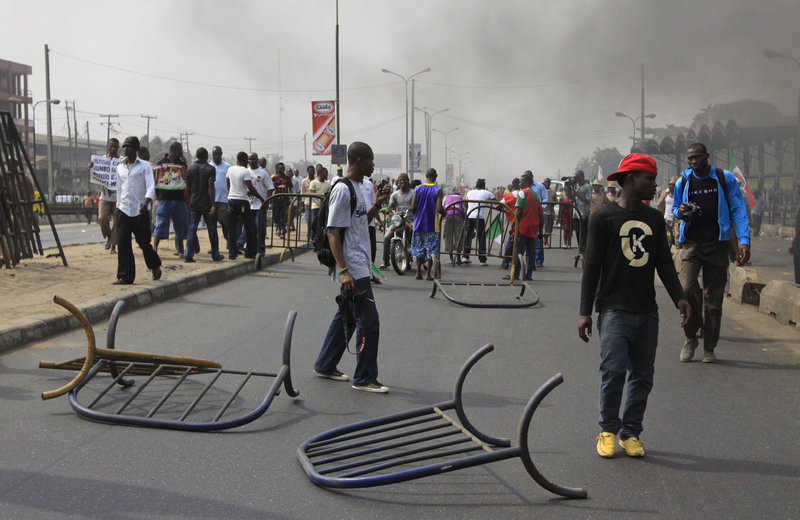LAGOS, Nigeria — A national strike fueled by widespread dissent over spiraling gas prices paralyzed Nigeria on Monday, as tens of thousands of protesters took over the empty streets to criticize government corruption.
Protests remained largely peaceful across the country on the strike’s first day, though a police shooting in Lagos left one dead and four wounded, while another in the northern city of Kano killed two more.
Still, the widespread anger could be felt just like the heat pouring off burning tires and debris left scattered by some protesters, upset by the ingrained graft and failures of Nigeria’s young democracy.
“It is high time to take Nigeria into our hands,” said Bola Adejobi, 53, who works as an educational consultant and an interior designer. “It happened in Egypt. It happened in Libya.”
Labor unions called the strike after President Goodluck Jonathan’s administration announced Jan. 1 it unilaterally removed subsidies that kept gasoline prices low in the nation of 160 million people. The decision saw gas prices rise from $1.70 per gallon to at least $3.50 per gallon. That spurred a spike in prices for food and transportation across a country where most live on less than $2 a day.
Cheap gasoline remains the only noticeable benefit for Nigeria’s public after 50 years of oil production that has seen military leaders and politicians embezzle billions in government funds. Gasoline also remains vital in a nation where electricity remains scarce.
“People have to understand that in the West, petrol is for your car. In Africa, in Nigeria especially, petrol is your life,” said musician Seun Anikulapo-Kuti, son of the late Afrobeat legend Fela. “There’s no light without petrol. Everybody runs a generator.”
The scope of the strike Monday became clear at first light in Lagos. The typically snarled streets of the commercial capital stood empty. Trade unions set up informal roadblocks, aided by local gang members who attacked cars of those driving in spite of the strike.
More than 10,000 people later gathered at a public park in Lagos, with nearly everyone shouting their criticisms of Jonathan and Nigeria’s federal government. Placards and banners bore an effigy of Jonathan with devil horns and fanged teeth, working as an attendant at a gas station. In Nigeria’s capital Abuja, thousands also demonstrated in the streets.
While most businesses remained closed Monday, oil production apparently continued in Nigeria, which produces about 2.4 million barrels of oil a day and remains a top crude supplier to the U.S.
Anger also extended to the government’s weak response to ongoing violence in Nigeria by a radical Muslim sect that, according to the Associated Press, killed at least 510 people last year.
Send questions/comments to the editors.



Success. Please wait for the page to reload. If the page does not reload within 5 seconds, please refresh the page.
Enter your email and password to access comments.
Hi, to comment on stories you must . This profile is in addition to your subscription and website login.
Already have a commenting profile? .
Invalid username/password.
Please check your email to confirm and complete your registration.
Only subscribers are eligible to post comments. Please subscribe or login first for digital access. Here’s why.
Use the form below to reset your password. When you've submitted your account email, we will send an email with a reset code.